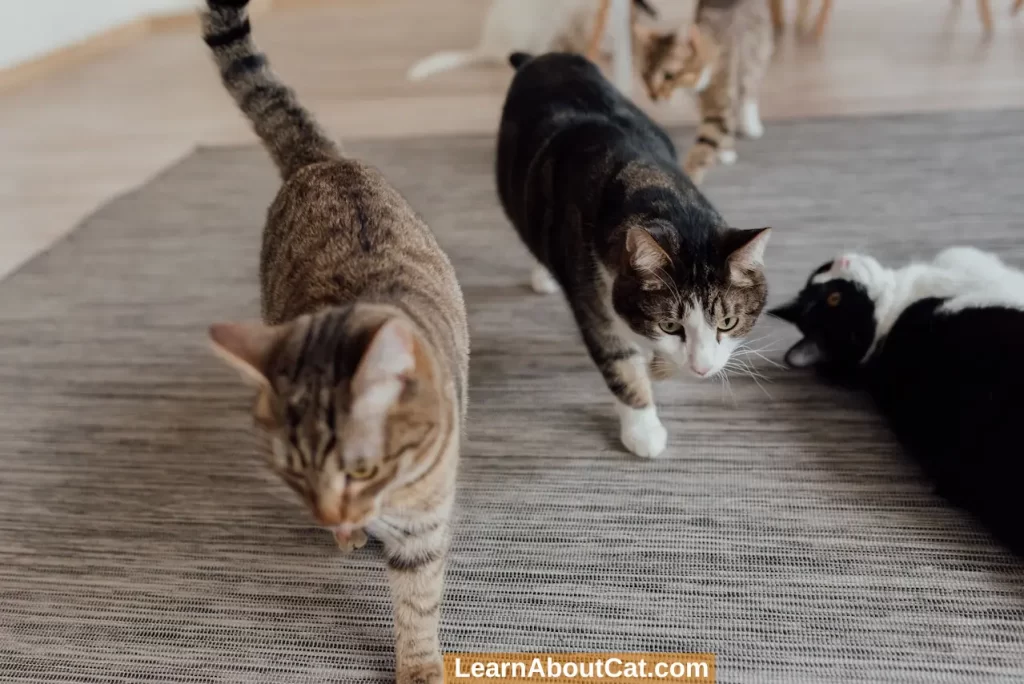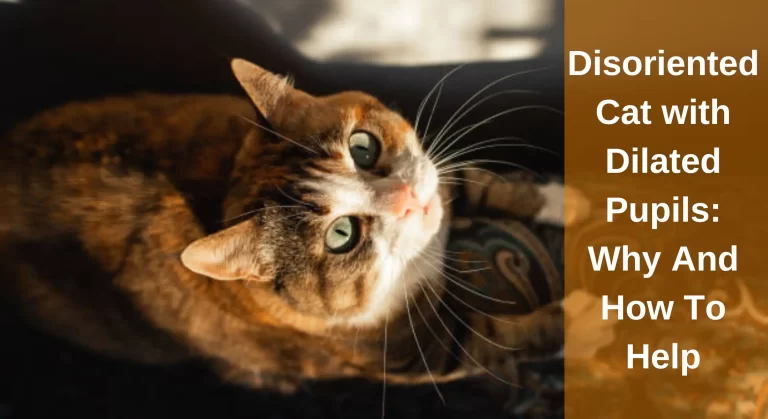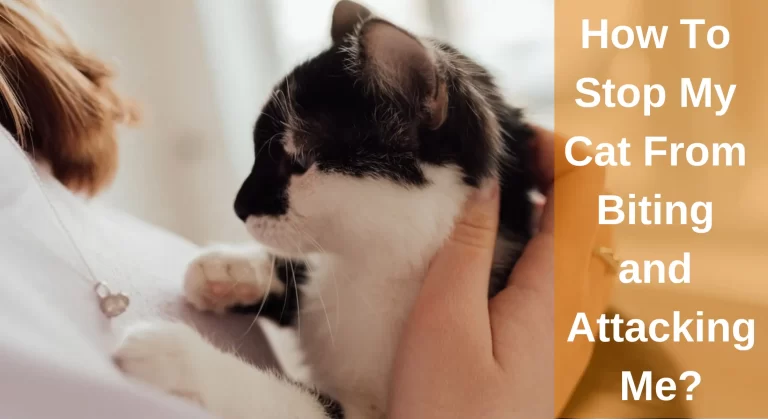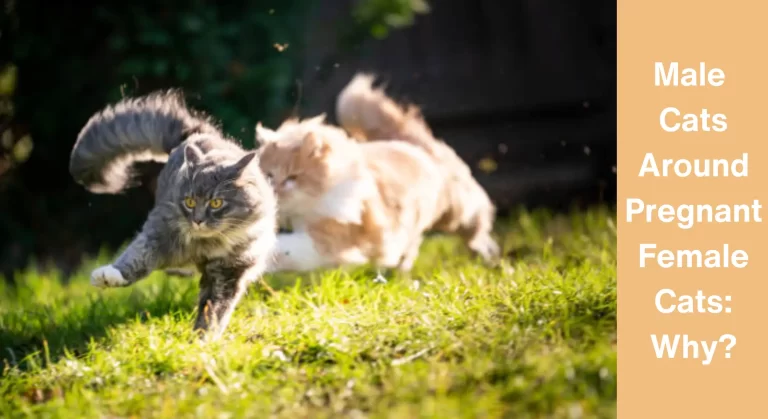When Will My Cat Stop Hissing at New Kittens or Cats?
Bringing a new kitten into your home can be an exciting time for your family, but it can also be stressful for your resident cat. If you’re a cat owner, you may have experienced introducing a new kitten or cat to your resident feline and witnessed hissing behavior. And it’s natural to wonder, “when will my cat stop hissing at new kittens”? Hissing is a natural response when a cat perceives a potential threat or is feeling anxious or stressed.
It’s common for the resident cat to hiss to show discomfort or disapproval. While seeing your cat hiss at the new kitten may be alarming, it’s normal behavior that can be managed with the right approach.
In this article, we’ll discuss what causes hissing behavior in cats, how to help your cats get along, and when you can expect your cat to stop hissing at the new kitten.

Understanding Cat Hissing Behavior
Hissing is a common behavior in cats and is often a sign of discomfort or anxiety. When a new kitten is introduced to the household, the resident cat may feel threatened or stressed by the unfamiliar presence. As a result, they may hiss to communicate their discomfort.
It’s important to remember that hissing is normal behavior and does not necessarily mean that your cat will not accept the new kitten. Cats are territorial animals and may take some time to adjust to a new addition to the household.
Find Out: Why Do Mother Cats Attack Their Older Kittens?
What Causes Hissing Behavior in Cats?
Cats hiss as a defensive behavior when they feel threatened or frightened. There is no need to worry about your resident cat becoming territorial and defensive when you introduce a new kitten to him. Hissing is a way for your cat to communicate that they’re uncomfortable and don’t want to be approached.
Why is My Cat Hissing at My New Kitten?
Due to their habitual and routine nature, cats do not always welcome change. Introducing a new kitten into the household can disrupt the existing hierarchy and territorial boundaries that your cat has established. This disruption can cause your cat to feel threatened, anxious, or stressed, leading to aggressive behavior such as hissing.
1. Territorial Aggression
Cats are territorial animals and may see a new cat as a threat to their territory. To warn them of the new cat, they may become aggressive and hiss at them.
Cats are known to mark their territory by spraying, scratching, or rubbing their scent on objects in the home. When a new kitten enters the household, your cat may feel like their territory is being invaded, leading to hissing and other aggressive behaviors.
One way cats communicate their discomfort or aggression is by hissing. Hissing is a warning sign that the cat is feeling stressed, scared, or angry. By hissing, the cat sends a message to the new kitten or cat that it should return and leave its territory.
However, hissing is not always a sign of aggression. Sometimes, cats will hiss to establish boundaries and let the other cat know that they should approach slowly or back off. This is a way for the cats to communicate and establish their hierarchy and social order.
2. Fear and Anxiety
Change in the environment can be scary and anxious for cats. Introducing a new kitten or cat can be stressful, and the resident cat may feel threatened by the new arrival, causing them to hiss.
Cats enjoy routine and do their best with a daily program. Most likely, they’ll eat their meals at the same time each day and get up at the same time every morning. Your cat will know when to expect playtime if you schedule it and when it’s time to put them to bed at night.
3. Lack of Socialization
If a cat was not socialized with other cats during their early development, it might not know how to interact with other cats. This can cause them to hiss and act aggressively toward new cats.
4. Your Feline Feels Trapped
The fight or flight system in cats will kick in if they feel boxed in with a new kitten, and if they are unable to fly, they may resort to fighting. If they hiss, they are anxious about their situation and are seeking some space from the kitten.
Also, Check Out: Symptoms of Cat Depression After a New Kitten
5. Their Temperament is Aggressive
There are some cats that hiss at new kittens simply due to their aggressive temperament. Rescued cats or cats who have been traumatized in the past often exhibit this behavior. It may take longer for these cats to warm up to a new kitten because their aggression and hissing may persist for longer.
Getting a new kitten may not be the best idea if you already have an aggressive cat. While you may be tempted to get a new kitten, you need to keep both cats happy.
6. Medical Issue
Hissing can sometimes be a sign of an underlying medical issue. Pain or discomfort can cause a cat to hiss, and if you notice a sudden change in your cat’s behavior, it’s essential to take them to the vet for a checkup.
Also Read: Can Cats Kill Each Other?
When Will My Cat Stop Hissing at New Kittens?
There’s no set timeline for when your cat will stop hissing at the new kitten, as every cat is different. Some cats may stop hissing within a few days, while others may take several weeks or even months to get used to the new kitten.
The key is to be patient and provide your cats with a comfortable and safe environment to help them adjust.

How to Get Your Cat to Stop Hissing at Your New Kitten?
If you have a resident cat and you bring home a new kitten, there’s a good chance your cat will hiss at the newcomer. This is a common behavior that many cats display when they’re introduced to a new cat.
However, with patience and the right approach, you can help your cat, and kitten get along peacefully. This article will discuss the steps you can take to get your cat to stop hissing at your new kitten.

1. Keep your Cats Apart initially
A new kitten should be kept separate from your cat at first, as It might be challenging to adapt to a new cat suddenly appearing in your home when you bring your new kitten home for the first time. Therefore, to prevent confrontation, you should initially keep your two cats apart.
Additionally, it will take some time for your new kitten to become used to their surroundings before they start to get angry and make things worse.
Consider placing your kitten in a separate room with their litter box, food, water bowls, and toys.
2. Introduce Your Cat and Kitten Slowly and Carefully
A gradual and careful introduction is the first step to getting your cat and kitten along. It’s important to allow your resident cat time to adjust to the new kitten’s presence.
Swap bedding between the two cats so they can get used to each other’s scents. Gradually increase the time they spend together until they can be in the same room without hissing or growling.
Also Read: How To Introduce A Kitten To An Older Cat?
3. Provide Separate Living Spaces
Security and safety are important to cats, and they need their own space. Providing separate living spaces for your resident cat and your new kitten is essential.
It is necessary to provide each cat with its own food, water, litter box, and sleeping space. This will prevent any competition for resources and reduce the chances of fights.
4. Spend More Time Together as they Progress
Once your cats are comfortable with each other’s scents, you can start to introduce them through a barrier, like a baby gate or screen door. By doing this, they will be able to see and smell each other without touching each other.
You may progressively increase the amount of time your cat and kitten spend together after they are both able to walk about without hissing.
Until your cats are able to spend extended periods of time together without becoming hostile, keep a watch on them. If your cats haven’t hissed in about a week, you can let them roam alone.
5. Use Synthetic Pheromones to Reduce Stress
In your home, you can create a soothing environment for your cats with Feliway diffusers or sprays that contain synthetic cat facial pheromones. This will help your resident cat, and your new kitten feel more relaxed around each other.
6. Positive Reinforcement
Positive reinforcement can help encourage good behavior between your cat and kitten. Cats respond well to rewards. Rewarding positive behavior is the best way to get along with them.
Giving your cats treats or praising them when they interact peacefully will reinforce their good behavior and help them associate positive experiences with one another.
7. Supervise Their Interactions
Supervising your cat and kitten’s interactions at all times, especially during the initial introductions, is crucial. Keep a close eye on their body language and intervene if you notice any signs of aggression. Redirect their attention with toys or treats if necessary.
Intresting Reading: How to Stop My Cat From Bullying My Other Cat?
8. Be Patient
Getting your cat to stop hissing at your new kitten takes time and patience. Cats are creatures of habit, and it may take several weeks or even months for them to get used to each other. Don’t force them to be together if they’re not ready; don’t punish them for hissing or growling. Instead, give them space and time to adjust to the new situation.
9. Don’t Punish Your Cat
Punishing your cat for hissing at your kitten will only make the situation worse. Your cat is communicating their discomfort, and punishing them will only make them feel more stressed and anxious.
How to Address Aggressive Behavior? Managing Hissing and Aggression
If your cat continues to hiss or shows aggression towards the new kitten, here are some tips to help manage the behavior:

- Give your cat plenty of attention and affection to help them feel secure.
- Provide plenty of resources, such as food, water, and litter boxes, to prevent competition between your cats.
- Consider using a pheromone collar or diffuser to help calm your cats.
- If your cats show signs of aggression, such as growling or swatting, separate them immediately.
- Consider consulting a veterinarian or a professional behaviorist if your cats continue to exhibit aggressive behavior.
Frequently Asked Questions
Is it normal for my cat to hiss at the new kitten?
Yes, it’s normal for cats to hiss when they’re introduced to a new kitten. Hissing is a way for your cat to communicate their discomfort or disapproval.
How long will my cat hiss at my kitten?
The time it takes for your cat to stop hissing at the new kitten can vary. Depending on the cat, it may take a few days, a few weeks, or even months before your cat stops hissing at the new kitten.
Should I punish my cat for hissing at the new kitten?
No. Punishing your cat for hissing at the new kitten can worsen the situation. Instead, provide plenty of positive reinforcement and give your cat time to adjust to the new addition to the household.
Can I leave my cat and new kitten alone together?
Supervising your cat and new kitten when they’re together is important until you’re confident they can coexist peacefully. Start with short periods of supervised interaction and gradually increase the time as your cats become more comfortable with each other.
What should I do if my cat becomes aggressive toward the new kitten?
If your cat becomes aggressive towards the new kitten, separate them immediately and consult with your veterinarian for additional advice. It’s important to address aggressive behavior before it becomes a serious issue.
Will my cat ever accept the new kitten?
With time and patience, most cats will accept a new kitten. However, your cat is not guaranteed to become best friends with the new kitten. Some cats may always prefer to keep their distance.
How can I help my cats get along better?
You can do several things to help your cats get along better, such as providing plenty of resources, such as food bowls and litter boxes, and giving each cat plenty of attention and affection. Using a pheromone diffuser or collar can promote calmness and reduce stress.
Final Words!
If so, when will my cat stop hissing at newly born kittens? This won’t happen until your two cats feel secure coexisting as a unit. Their new schedule and relations required them to adjust. After doing this, the two should get along and perhaps even become best friends. This procedure typically takes two to three weeks.
Nevertheless, some cats could get along with the kitten right away, while others might be less eager to include the kitten in their family. Never try to go too quickly; instead, move at the pace that is necessary. Be patient and make an effort; your two cats should be able to get along.
Related Posts:
Who is Isabella?
My name is Isabella, and I am a dedicated and knowledgeable cat enthusiast. With years of experience caring for cats and a deep love for felines, I made a mission to help other cat lovers navigate the challenges of cat ownership.






